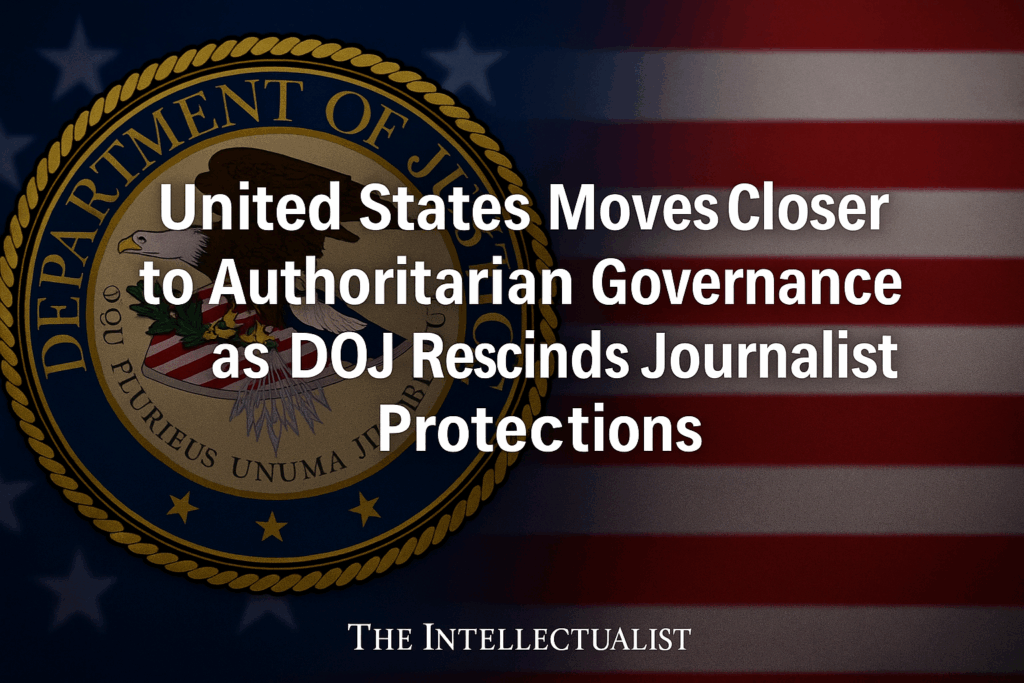United States Moves Closer to Authoritarian Governance as DOJ Rescinds Journalist Protections

On April 25, 2025, Attorney General Pam Bondi announced a significant reversal of Justice Department policy, rescinding Biden-era protections that had shielded journalists from government subpoenas and leak investigations. This decision, which was first reported by Politico and confirmed by outlets such as Reuters and The Guardian, marks a substantial erosion of press freedoms and is viewed by democracy experts as a further step in the United States’ shift toward authoritarian governance.
Bondi’s memo, circulated internally within the Department of Justice and later made public, criticizes the restrictions put in place by former Attorney General Merrick Garland during the Biden administration. Those policies had largely prohibited federal prosecutors from seeking phone records, emails, or testimony from journalists during leak investigations, in an effort to protect First Amendment rights and preserve a free press as an essential pillar of democracy.
Bondi claimed that the Biden administration had “abused” these protections, accusing it of engaging in “selective leaks” intended to support what she called “failed lawfare campaigns” against Trump-era policies. She specifically cited reporting by The New York Times related to the January 6th investigation as evidence of this alleged misuse.
Under the new Bondi guidelines, federal investigators are now once again permitted to issue subpoenas, court orders, and search warrants to compel journalists to disclose information about their sources and leak-related materials. Although Bondi stated that such powers would be used “cautiously” and only as a “last resort,” press freedom organizations have warned that the rollback will have a chilling effect on investigative journalism and discourage whistleblowers from exposing government misconduct.
Bruce Brown, executive director of the Reporters Committee for Freedom of the Press, condemned the policy reversal, emphasizing that it threatens the confidentiality of sources and undermines the public’s right to know about government activities. He warned that the chilling effect could severely damage accountability journalism at a time when executive power is expanding unchecked.
This development is part of a broader trend within the Trump administration’s second term, in which the use of federal agencies to suppress dissent, target political opponents, and curtail civil liberties has accelerated sharply. Scholars of authoritarianism note that control over the press is a defining feature of illiberal regimes, and that weakening legal protections for journalists is often a precursor to broader crackdowns on free expression.
According to political analysts, Bondi’s memo and the broader strategy behind it fit a recognizable authoritarian pattern: delegitimize independent institutions, suppress critical media coverage, and remove legal obstacles to state surveillance and retaliation against dissenters. While formal democratic structures—such as elections—still exist in the United States, critics argue that the substance of democracy is being hollowed out from within.
Press freedom watchdogs have sounded alarms over other recent moves by the Trump administration, including tighter control over the White House press pool, threats against major media outlets, and efforts to install loyalists at federally funded news organizations like Voice of America. Each of these actions has chipped away at the adversarial relationship between the press and those in power—a relationship that has historically been considered vital to the health of American democracy.
The rollback of journalist protections occurs in the context of a broader erosion of constitutional norms. Legal scholars warn that as the executive branch expands its power to punish perceived enemies—whether judges, journalists, or political opponents—the traditional checks and balances that restrain presidential authority are being systematically weakened. As one legal analyst put it, “We are witnessing not the sudden collapse of democracy, but its slow, deliberate suffocation.”
The Department of Justice under Bondi insists that protections for journalists will not be abandoned entirely, emphasizing that subpoenas will require senior leadership approval and that journalists will receive advance notice before any compelled disclosures. However, critics argue that such internal safeguards are insufficient in the absence of legally binding external constraints.
As of April 2025, the United States still maintains many outward appearances of a liberal democracy: elections, courts, and a free press. But the reality beneath the surface is shifting. Actions like Bondi’s rescission of journalist protections suggest that the country is moving down a path where dissent is increasingly dangerous, truth is more easily suppressed, and power is concentrated in fewer and fewer hands.
If the trend continues unchecked, experts warn, America may soon join the ranks of democracies that died not with violent coups, but with the gradual normalization of authoritarian practices.

